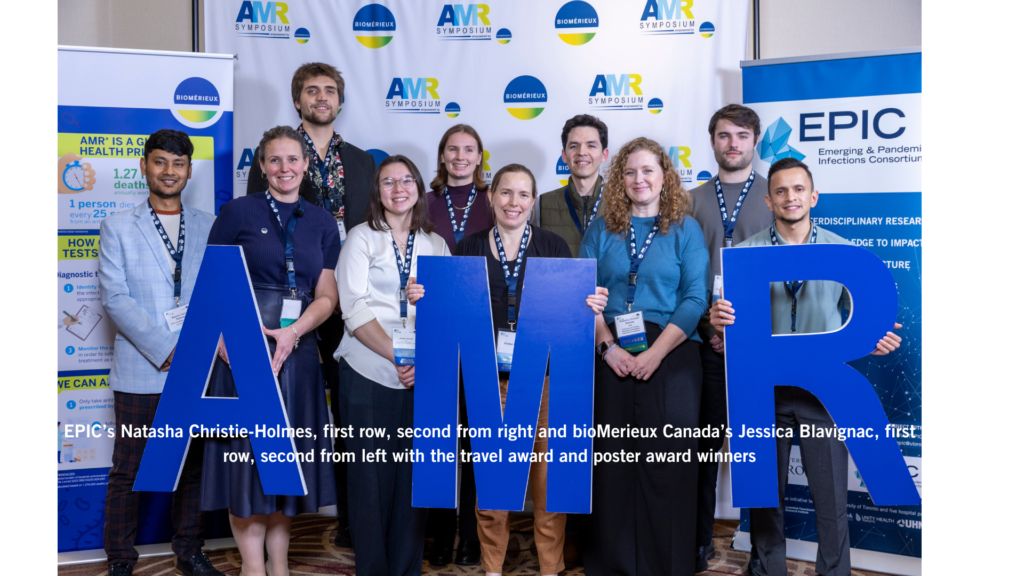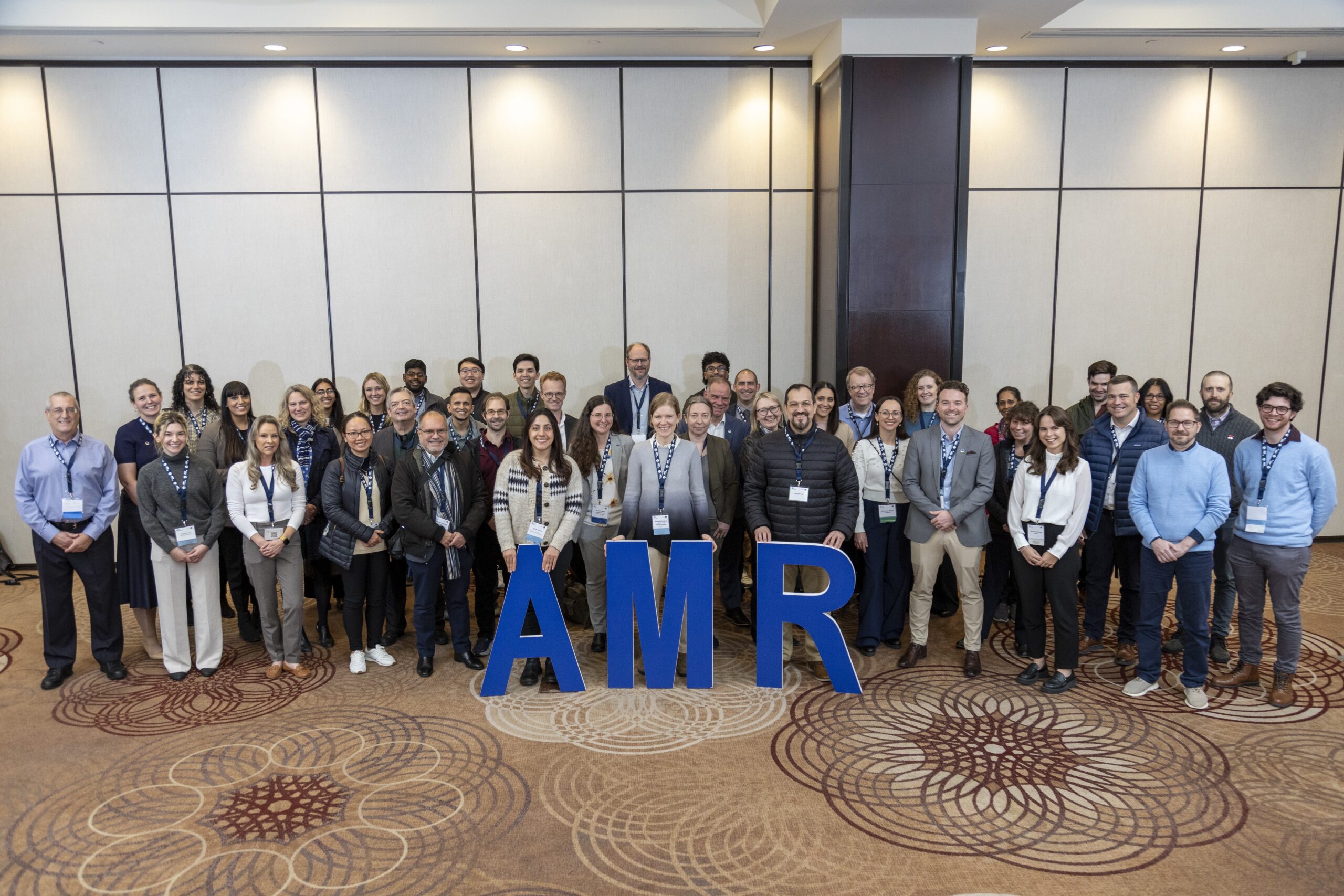December 16, 2024
By Sunitha Chari
Coinciding with the World Antimicrobial Resistance (AMR) Week, the Emerging and Pandemic Infections Consortium (EPIC) once again co-hosted the third annual AMR Symposium on November 19 and 20 empowered by bioMérieux Canada and an amazing cast of partners.
The two-day event brought together over 400 clinicians and researchers in human and animal health, along with industry and government representatives, to discuss innovative research developments, challenges and opportunities to address the AMR health crisis.
This year the symposium was presented in collaboration with the Critical Care Canada Forum and Sepsis Canada. This aligns with the growing knowledge that AMR contributes to an increasing number of sepsis cases, complicating highly time-sensitive treatment for these patients.
Highlighting the urgent need for effective management of AMR and sepsis, Kali Barrett (Toronto General Hospital Research Institute, University Health Network) called for the development of a sepsis national plan, similar to the pan-Canadian AMR Action Plan, which rests on the 5 pillars of research and innovation, surveillance, stewardship, infection prevention and control and leadership to confront the threat to human, animal and agricultural health that AMR poses.
The talks and discussions at the symposium provided strategies and methods to strengthen all five of these pillars and provided attendees with One Health perspectives on the AMR challenge.
On the first day of the symposium, EPIC, the Institute for Pandemics and the Temerty Centre for AI Research and Education in Medicine co-hosted a panel presented under the theme Tools to Power the Fight Against AMR. Keynote speaker, Cesar de la Fuente (University of Pennsylvania), joined by Artem Babaian (University of Toronto), Dionne Aleman (U of T) and moderator Ivan Semeniuk (The Globe and Mail) discussed the potential of artificial intelligence to develop new infectious disease interventions and fuel biologic discovery.
Highlights of the first day also included a poster session with representation from close to 60 national and international AMR projects, including 25 EPIC trainees who presented their ongoing AMR research. Kirsten Meyer, a postdoctoral fellow in Justin Nodwell’s laboratory in the department of biochemistry, Temerty Faculty of Medicine, was awarded the EPIC poster prize for her work on developing a drug delivery system that packages antimicrobials and antifungals into bacterial extracellular vesicles. “The projects presented, and the enthusiastic, collaborative conversations during the poster session speak to the multi-disciplinarity of the EPIC community and the united efforts already taking place to confront AMR,” said Natasha Christie-Holmes, EPIC’s director of Strategy and Partnerships.
The second day of the symposium began with an introduction to the newly launched Canadian Antimicrobial Resistance Network (CAN-AMR-Net), a pan-Canadian initiative funded as a Health Research Training Platform by the Canadian Institutes of Health Research to create a unified One Health AMR research training approach in Canada. Moderated by Herman Barkema (University of Calgary), the panel discussion included EPIC’s Natasha Christie-Holmes who alongside Mary Wiktorowicz (York University) and Dao Nguyen (McGill University) laid out strategies and plans to strengthen Canada’s AMR training ecosystem.
Further elaborating on the pan-Canadian AMR action plan, the second day had informative talks and presentations on the development of environmental surveillance methodologies and rapid point-of-care- and near patient- diagnostics to detect AMR pathogens in hospital and healthcare settings.
On the themes of stewardship and prevention to address AMR, EPIC faculty member, Larissa Matukas (St. Michael’s Hospital, Unity Health Toronto), discussed behavioural strategies to help prescribers of antibiotics make informed decisions and Epshita Islam, a research associate in Temerty Medicine working with Scott Gray-Owen, EPIC’s academic director, and a professor of molecular genetics, and Trevor Moraes, EPIC member and professor of biochemistry, presented her preclinical research developing vaccines against Neisseria gonorrhoeae, the cause of gonorrhoea. Antibiotics are required to treat the 82 million gonococcal infections that occur worldwide each year, but the bacteria has acquired resistance to most clinically relevant antibiotics. “Multidrug resistance is threatening to make this once forgotten disease an untreatable infection, leading to the recent global push for vaccines against N. gonorrhoeae,” said Islam.
The symposium ended with a live podcast featuring a conversation between The Canadian Breakpoint Podcast’s host Rupeena Purewal (University of Saskatchewan) and Bradley Langford (Public Health Ontario) to introduce ‘AMR Aware Canada’, a campaign aimed at building a network of leaders and experts from research, education and healthcare along with like-minded community members to join forces and push forward advocacy about AMR.
“I am so grateful for the opportunity to work with our partners to host this important event and to hear the thoughtful presentations by our speakers. The enormous threat posed by antimicrobial resistance compels us to come together to implement innovative solutions to combat its emergence and reduce its impact on public health,” said Gray-Owen.
EPIC worked together with bioMérieux Canada, AMR – One Health Consortium, McGill AMR Centre, the Association of Medical Microbiology and Infectious Disease Canada, Critical Care Canada Forum and Sepsis Canada to host this year’s AMR Symposium.





